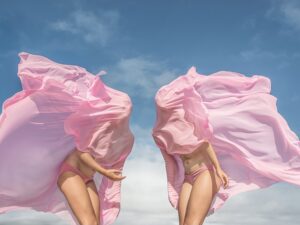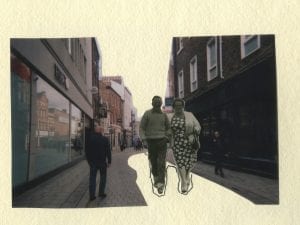Plymouth College of Art’s 2017 Degree Show, Breaking Through, looked at the future of art and design through multi-disciplinary methods through forward-thinking individuals and a shared vision for contemporary expression. Maciej Krzyminski’s (BA Hons Photography) graduate series Seven Trees explores themes of memory and nostalgia, utilising delicate composition and minimalist arrangements.
A: How does your graduate series, Seven Trees, explore memory and nostalgia, and why did you want to communicate these themes?
MK: Seven Trees is a body of work that explores the pursuit of reconnecting with earliest childhood memories. It’s a sentimental longing for a period of time, from the past, or perhaps longing for something that never was. This experiment is a way of trying to heal a wound or maybe go back in time, but certainly an attempt to reconnect to a moment. Each image represents a chosen memory, which could seem simple, but everything within the frame has been carefully thought through. There is not a single object within the image that was not meticulously considered. I hope the simplicity allows the viewer space to interpret the photographs in their own way.
A: How do you think that photography can communicate intimacy, especially in a time of digitalisation where media content is constantly reproduced and shared?
MK: For me, this project is very private. In a time of digitalisation where media content is constantly reproduced and shared it becomes harder to produce something unique, as it might seem as though everything has been photographed already. However, I believe that it is not always what you photograph, but more importantly why and for what purpose. Intimacy is a very popular subject across the language of photography, and although this body of work is about childhood memories, which are very personal and intimate to me, I’ve done so with an abstract and symbolic approach that can be interpreted differently by each individual. I have instilled simplicity in the images, so in a sense, everyone can interpret a different response, because we all have our “like” and “dislike” charts.
When we interpret photographs, we engage our cultural competence, we recognise objects, effigies of humans and animals. It does not happen naturally, but culturally. We are part of a social group in a specific time, which follows specific cultural rules, which causes us to look at the world in a specific way. My images allow for this.
A: How do the images connect with the Degree Show’s wider theme of risk-taking and convention-breaking?
MK: I have taken a risk by producing a body of work completely out of my comfort zone. The result of an extensive period of research during which I was motivated to produce this still life series of images, a series I did not initially feel comfortable with, but the process of breaking through into that comfort zone has made this work what it is today. I believe I have found my style and the type of work that hopefully people will recognise and associate with my name.
A: Could you describe the process in terms of mapping out compositions and making stylistic decisions?
MK: Although the images may look very simple, everything within the frame has been carefully selected and thought-through. Each individual image is a combination of symbols and objects related to the chosen memory. For example, the featured image looks back to a narrative that began in my childhood. I was four years old when, alone in the room, I found a bottle of perfume. I was intrigued by how the perfume was dispersed from the bottle with each spray. Wanting to see it closely led to me spraying the perfume in my eyes. The mirror represents “looking”, and for quite some time I searched for the perfect mirror, both vintage and photogenic to create an image outside of time; timeless. The tomatoes do not represent the perfume, but symbolically the warning, the danger, the pain of an angry red eyeball.
Space is also empty for a reason; when recalling a memory, remembering images can be like trying to remember a dream you’ve just woken up from. We remember the person, the place, shapes and forms, but as soon as we try to focus on details, it becomes blurry and faded, it feels like an illusion. Looking back on the memory of the perfume bottle, I remember the objects and the feelings, but what happened the moment before and the moment after is unknown, so is the surrounding. That is why space is empty.
A: How is this series different from your previous works?
MK: In terms of composition, as well as stylistic decision, on both Seven Trees and my previous work Lost, they are completely two different type of images with different genres of photography and a new colour palette. The visual difference is very noticeable, and is a consequence of creating a completely new body of work outside of my comfort zone. Seven Trees has a much stronger concept with answers for questions I always struggled to answer – why and what for.
A: Who has been your biggest influence?
MK: This body of work is not a result of being influenced by a single artist, photograph or project, it is a result of all my research combined which includes; reading books, articles, posts, attending professional symposiums and photography conferences, as well as conversations with lectures and other creative minds. Absorbing a visual inspiration came from across many platforms, gallery space, posters, paintings, photography books, but also social media.
I have also absorbed a lot from my partner, Kinga Burakowska, who is also a photographer. The style has developed and been combined into a mixture of two people. Not just influence but inspiration and support on each step of this journey, both visually and contextually.
A: How has your time at Plymouth College of Art shaped your vision as an artist, and what you want to achieve through your works?
MK: Being immersed in this arts institution has been very beneficial. The focus on a diverse range of arts programmes means that the people you meet around the college understand visual language, so having a chat with a fellow student or technician can instigate a great exchange of knowledge. There is a comfortable atmosphere right from taking the first step into the building. Plymouth College of Art is a fantastic place for making and learning, it has shaped my vision as an artist and has allowed me to progress and continue producing more work.
A: What are your future plans for 2017?
MK: Break-through the competition, work hard and push boundaries to produce work that will be noticed. Hopefully, continue building my passion into a lifelong career.
Maciej Krzyminski’s work is on display as part of the 2017 Free Range Graduate Shows until 26 June. For more information: www.free-range.org.uk
Credits:
1. Maciej Krzyminski.





